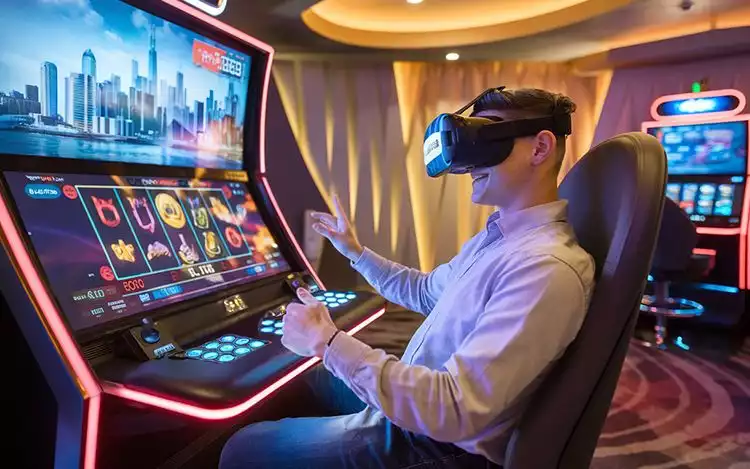How have slot machines evolved from mechanical reels to immersive digital experiences? From their simple mechanical origins to the dazzling video slots of today, these iconic machines have undergone a dramatic transformation — influencing entertainment and gaming culture worldwide.
In this article, we’ll take a journey through the history of slot machines, examining three key areas that highlight their evolution:
- The Mechanical Era: Early Innovations & Icons
- The Digital Revolution: Transition to Video Slots
- The Future: Emerging Trends in Slot Technology
Let’s delve into the Mechanical Era, where early innovations set the foundation for the global phenomenon of top UK slot games.
Note: This content is intended for UK users and references games offered by UKGC-licensed operators.
The Mechanical Era: Early Innovations & Icons
The birth of the slot machine dates back to the late 19th century with the creation of the Liberty Bell by Charles Fey in 1895. This simple mechanical machine introduced the world to the basic concept of slots, setting the stage for what would become a global phenomenon. These early machines relied on mechanical levers, gears, and springs. They featured symbols like bells, fruits, and bars, elements that still play a key role in slot design today.
Iconic Machines from the Early Era:
- Liberty Bell: The first widely successful slot machine, its design became the prototype for all subsequent machines. With just three reels and five symbols, it introduced the idea of a payout based on a combination of symbols. The Liberty Bell’s simplicity laid the groundwork for the modern slot experience.
- One-Armed Bandit: The nickname One-Armed Bandit originated from the mechanical slot machine’s design, featuring a lever (often referred to as an “arm”) used to spin the reels. These machines became incredibly popular in the early 20th century, symbolizing both the excitement and unpredictability of gambling.
- The Jackpot King: As technology advanced, multi-reel machines like The Jackpot King emerged, allowing for more complex gameplay and larger payouts. This development marked a significant step toward the slots we know today.
The first slot models established the foundation for modern slot gameplay with the introduction of mechanical reels and chance-based outcomes. Their straightforward design influenced today’s slot experiences, where anticipation remains a key aspect of gameplay.
![]()
The Digital Revolution: Transition to Video Slots
The 1990s marked a significant shift in the slot industry with the rise of digital technology. Video slots replaced mechanical reels with digital graphics, introducing new interactive elements. Advancements in computer technology enabled multi-line betting, bonus rounds, and themed slots, expanding the variety of games available to players worldwide.
Iconic Digital Slot Machines:
- Wheel of Fortune: As one of the earliest video slots to gain popularity in both land-based casinos and online, Wheel of Fortune played a key role in shaping the industry. Its introduction in the 1990s brought a television-themed format, blending entertainment with gaming. The game remains popular today. The MegaJackpots Wheel of Fortune On Air variant offers progressive jackpot opportunities alongside modern features.
- Starburst: Released in 2012, Starburst quickly became one of the most popular video slots worldwide, particularly in the UK. Known for its simple mechanics and vibrant, cosmic visuals, it has become a symbol of the sleek, player-friendly nature of modern slots. With features such as expanding wilds and respins, Starburst provides dynamic gameplay suitable for a wide range of playing styles.
- Mega Moolah: A defining game in the rise of progressive jackpots, Mega Moolah gained attention for its large jackpot potential. Known for its African safari theme, it has awarded substantial prizes to some players. However, as with all slots, outcomes are determined by chance and governed by licensed RNG systems—jackpots are never guaranteed.
Digital advancements have expanded the variety and accessibility of slot games, introducing themed experiences, interactive bonus rounds, and multi-line betting options. While these innovations enhance engagement, responsible gaming remains essential. Outcomes are based on RNG systems to ensure fairness. Always play within your means and use available responsible gambling tools when needed.
![]()
The Future: Emerging Trends in Slot Technology
As technology continues to evolve, so does the future of slot machines. In the coming years, the slot industry is expected to see major advancements driven by innovations in Virtual Reality (VR), Augmented Reality (AR), and blockchain technology. These developments have the potential to redefine the way players interact with slots and what they can expect from their gaming experience.
Emerging Trends in Slot Technology:
- VR & AR Slots: Virtual Reality and Augmented Reality are expected to revolutionize the casino experience. Players could soon find themselves immersed in 3D virtual casinos, with slot machines offering interactive environments that allow for a more lifelike and engaging experience. The integration of VR into gaming is already gaining momentum, with industry leaders like IGT and NetEnt exploring VR-based gaming products.
- Blockchain Technology & Crypto Slots: As cryptocurrencies gain popularity, blockchain technology is being integrated into slot machines to offer greater security and transparency. Bitcoin casinos have been adopting crypto slots, which allow for faster transactions and anonymity. These slots use blockchain’s decentralized ledger technology to ensure fair play and secure payouts.
Important Note: These technologies are not permitted under UKGC-licensed operators at present.
- Interactive & Skill-Based Slots: Certain developers are testing games that incorporate player actions, blending arcade-style mechanics with slots. A significant development in this area is the collaboration between casinos and game developers to create more interactive experiences. For example, GameCo has pioneered skill-based slot machines, where players’ actions can influence their success, offering a unique blend of arcade-style gaming with traditional slots.
Important Note: UK-licensed slot games remain games of chance and are governed by RNG. UKGC does not permit skill-based elements to affect the final outcome of a slot game.
These advancements indicate a future where players are not only spectators but active participants in their gaming experience. The integration of VR, AR, and blockchain will continue to enhance the way slot games are played, offering greater transparency, immersive experiences, and the possibility of more player-driven outcomes.

Experience The Evolution
From their mechanical origins to the modern digital experiences of today, slot machines have undergone a notable development over the years. As we look back on the history of these iconic games, it’s clear that each evolution — from the Liberty Bell to Mega Moolah — has shaped the landscape of gaming and influenced player experiences worldwide.
Key Takeaways:
- Mechanical slots, like the Liberty Bell, laid the foundation for the modern slot machine experience.
- Video slots revolutionized gameplay with dynamic visuals and interactive features.
- Emerging technologies like VR, AR, and blockchain will continue to redefine the future of slots, enhancing visual interactivity and personalisation, while maintaining responsible, chance-based gameplay.
Interested in learning more about how slots have changed over time? Prime Casino offers a range of games showcasing the ongoing evolution of slot machine technology—available for players who wish to explore further.









